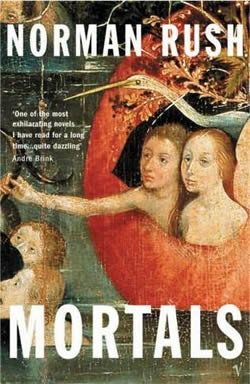 The Conventionalist
The Conventionalist
Norman Rush, Jonathan Franzen, and the Art of Being Pleasantly Off-Key
By Patrick McGinty
 ccording to fans of author Norman Rush, the world can be divided into two types of readers: those who consider Rush the greatest living American author, and those who have never read him.
ccording to fans of author Norman Rush, the world can be divided into two types of readers: those who consider Rush the greatest living American author, and those who have never read him.
I moonlight in this Rush cult, and the only reason I’m not a card-carrying member is because there are so many wonderful cults in which to moonlight. I dislike the word “greatest.” “Greatest” leads to conflict. Most often it leads to the wrong kinds of discussions, the kind that prey on a book’s weaknesses, that respond to each and every of its triumphs with yeah, but. These kinds of discussions undermine one of my strongest convictions: that works of art—particularly considerable achievements of art—bear more resemblance to one another than dissimilarity.
You can’t prove these sorts of things. Not really. They sound nice and all, but the language is always shaky. “Considerable” and “achievement” would not fare well under cross-examination. Nor would “resemblance” and “dissimilarity.” So rather than define them, let’s just talk about Rush. His first novel, Mating, is 480 pages, and that’s with the font and spacing on diets. I’m fascinated by writers who can sustain first-person narration over the course of an epic-length work, and I’m even more intrigued when this first-person narrator is quite obviously not the writer de facto. Mating was published in 1991, when Rush was 58, and his narrator is a woman in her late twenties. The story is her reflection on doctoral research she conducted in Botswana. She begins confidently yet cautiously:
In Africa, you want more, I think.
People get avid. This takes different forms in different people, but it shows up in some form in everybody who stays there any length of time. It can be sudden. I include myself.
Obviously I mean whites in Africa and not black Africans. The average black African has the opposite problem: he or she doesn’t want enough. A whole profession called Rural Animation exists devoted to making villagers want more and work harder to get it. Africans are pretty ungreedy—elites excepted, naturally. Elites are elites.
But in Africa you see middleclass white people you know for a fact are highly normal turn overnight into chainsmokers or heavy drinkers or gourmets...
 Wedged between two bold opening statements is that quick little “I think.” The pattern of qualification has been set. Where paragraph two is declarative, paragraph three backtracks with “obviously.” There is a brief and early reminder that the narrator includes herself among the “highly normal” people she proceeds to dissect. She knows things for a fact, she thinks.
Wedged between two bold opening statements is that quick little “I think.” The pattern of qualification has been set. Where paragraph two is declarative, paragraph three backtracks with “obviously.” There is a brief and early reminder that the narrator includes herself among the “highly normal” people she proceeds to dissect. She knows things for a fact, she thinks.
It’s a nifty little opening, one that bounces between conjecture and certainty. You could explain this oscillation any number of ways. Doctoral candidates do tend to speak in nervous declarations. It could be argued that the narration grows more comfortable as the focus narrows—we start with Africa at-large, move to whites and blacks, and finally settle on “middleclass white people,” a more manageable topic. The loose rhetorical footing could simply be chalked up to travel writing and the narrator’s awareness of its inherent flaw: outsiders run risks when they critique the home cooking.
But I also think that we are witnessing a small squirm on the part of the writer. A good kind of squirm. In bouncing back and forth between what I’m calling conjecture and certainty, it seems as though the older, male Rush is calling out notes against the pitch pipe, making sure he is in the right narrative key. He’s got to spend a long time with this young female narrator of his, and he wants to be spot on.
I came to this conclusion after seeing Jonathan Franzen squirm similarly in Freedom. Franzen is a regular topic in the debate concerning our “greatest living American author.” When the weather isn’t stormy, I moonlight in his camp, too. Freedom was what did it for me. After twenty or so pages of third-person introduction, Franzen gets on with the bulk of the novel in a faux-third-person autobiographical style. Patty Berglund’s “Mistakes Were Made” starts:
If Patty weren’t an atheist, she would thank the good Lord for school athletic programs, because they basically saved her life and gave her a chance to realize herself as a person. She is especially grateful to Sandra Mosher at North Chappaqua Middle School, Elaine Carver and Jane Nagel at Horace Greeley High School, Ernie and Rose Salvatore at the Gettysburg Basketball Camp, and Irene Treadwell at the University of Minnesota. It was from these wonderful coaches that Patty learned discipline, patience, focus, teamwork, and the ideals of good sportsmanship that helped make up for her morbid competitiveness and low self-esteem.
Patty grew up in Winchester County, New York. She was the oldest of four children, the other three of whom were more like what her parents had been hoping for. She was notably Larger than everybody else, also Less Unusual, also measurably Dumber. Not actually dumb but relatively dumber...
 Mating’s qualified opening thesis is here replaced by a profession of atheism followed by a prayer. Patty tries to pin down her values, though she can hardly pin down her adjectives. “Basically saved.” “Especially grateful.” Notably measurably actually relatively. There is the constant—perhaps gratuitous—presence of self-deprecation. Just as Rush’s narrator is quick to “include myself,” Franzen’s makes mention of Patty’s “low self-esteem.” By coincidence, the narration maps the narrator’s world, then settles on what we can safely presume are the middleclass white people of Winchester County, New York.
Mating’s qualified opening thesis is here replaced by a profession of atheism followed by a prayer. Patty tries to pin down her values, though she can hardly pin down her adjectives. “Basically saved.” “Especially grateful.” Notably measurably actually relatively. There is the constant—perhaps gratuitous—presence of self-deprecation. Just as Rush’s narrator is quick to “include myself,” Franzen’s makes mention of Patty’s “low self-esteem.” By coincidence, the narration maps the narrator’s world, then settles on what we can safely presume are the middleclass white people of Winchester County, New York.
Large, lauded books unfold from these two quoted sections, and in each I think we can see the writer beginning pleasantly off-key. Does that sound right? No, not quite. Is that an A#? That’ll do for now. And yet my initial thesis—that these older male writers need a moment to get in tune with their female narrators—is proven wrong over the course of each book. Each writer starts a bit off-key and, masterfully, stays there (particularly Rush, whose narrator is constantly testing and rejecting and remolding her various theses). For all that gets said in book blurbs about “definitive, singular” voices, for all the emphasis in writing classrooms about point of view and authenticity and strong first lines, these two epic novels address from the very first lines what each of us knows to be true: that we are full of doubt. That it is perhaps impossible to accurately represent ourselves, certainly as far as the page is concerned. Out of strict childhood instruction, I am a compulsive thank-you note writer. Few things cause me greater stress. My notes are either cold and perfunctory (it is much appreciated) or childish and cheesy, punctuated by the sorts of jokes that I can’t bear to have repeated.
Rush and Franzen know how hard it is to get voice on the page, and they don’t fight it. By comparing their significant achievements, we see that their efforts resemble one another. They allow for uncertainty to poke holes in their syntax. They live with these doubts for the duration of their respective books. They know the pitch pipe is broken. It probably never worked right at all. After all, it is a human invention, no different than fiction. Patrick McGinty's fiction has appeared, most recently, in ZYZZYVA and The Portland Review. In the summer issue, he reviewed Jon McGregor's story collection This Isn't the Sort of Thing That Happens to Someone Like You.
Patrick McGinty's fiction has appeared, most recently, in ZYZZYVA and The Portland Review. In the summer issue, he reviewed Jon McGregor's story collection This Isn't the Sort of Thing That Happens to Someone Like You.




